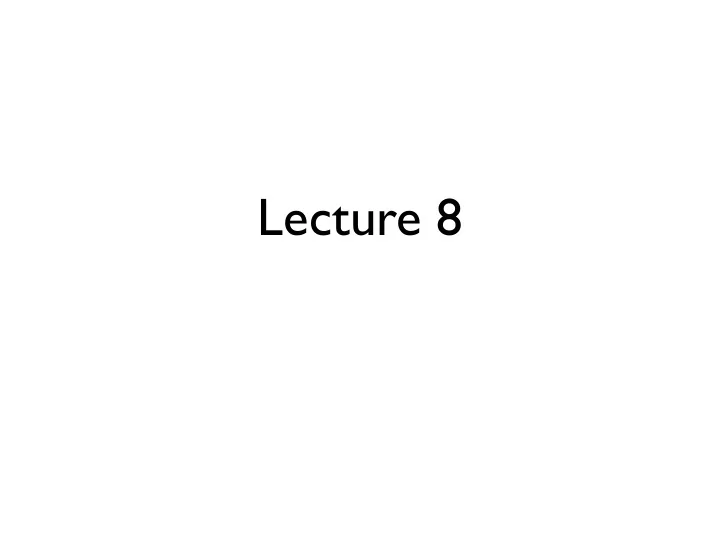

Lecture 8
Announcements re HW#1, Aeron says “If I made a comment, even if I didn't take off points this time, people should pay attention because I will take off points for the same mistake in the future...”
EQ TM is undecidable EQ TM = { <M 1 , M 2 > | M i are TMs s.t. L(M 1 ) = L(M 2 )}
EQ TM is undecidable EQ TM = { <M 1 , M 2 > | M i are TMs s.t. L(M 1 ) = L(M 2 )} Pf: Will show EMPTY TM ≤ T EQ TM Suppose EQ TM were decidable. Let M ∅ be a TM that accepts nothing, say one whose start state = q reject . Consider the TM E that, given <M>, builds <M, M ∅ >, then calls the hypothetical subroutine for EQ TM on it, accepting/rejecting as it does. Now, <M, M ∅ > ∈ EQ TM if and only if M accepts ∅ , so, E decides whether M ∈ EMPTY TM , which we know to be impossible. Contradiction
Linear Bounded Automata Like a (1-tape) TM, but tape only long enough for input (head stays put if try to move off either end of tape) Finite state control read/write head 0 1 0 1 1 1 ... 0 M = (Q, Σ , Γ , δ , q 0 , q acc , q rej ) L(M) = { x ∈ Σ * | M accepts x }
An Aside: The Chomsky Hierarchy TM = phrase structure grammars α A β→αγβ LBA = context-sensitive grammars α A β→αγβ , γ≠ε PDA = context-free grammars A →γ DFA = regular grammars A → abcB recog csl cfl reg
A LBA is decidable A LBA = { <M, w> | M is an LBA and w ∈ L(M) } Key fact: the number of distinct configurations of an LBA on any input of length n is bounded , namely ≤ n |Q| | Γ | n If M runs for more than that many steps, it is looping Decision procedure for A LBA : Simulate M on w and count steps; if it halts and accepts/rejects, do the same; if it exceeds that time bound, halt and reject.
EMPTY LBA is undecidable Why is this hard, when the acceptance problem is not? Loosely, it’s about infinitely many inputs, not just one Can we exploit that, say to decide A TM ? An idea. An LBA is a TM, so can it simulate M on w? Only if M doesn’t use too much tape. What about simulating M on w # # # # # # # # # # # # ?
Given M, build LBA M’ that, on input w # # # # ... #, simulates M on w, treating # as a blank. If M halts, do the same. if M tries to move off the right end of the tape, reject. L(M’) = { w# k | M accepts w using ≤ | w# k | tape cells } Key point: if M rejects w, M’ rejects w# k for all k, ∴ L(M’) = ∅ if M accepts w, some k will be big enough, ∴ L(M’) ≠ ∅
Recommend
More recommend